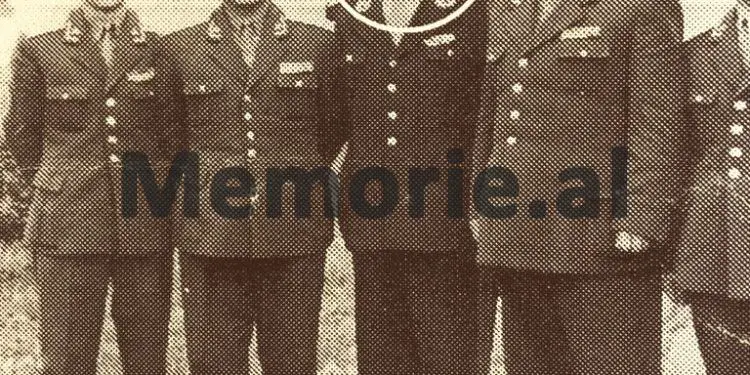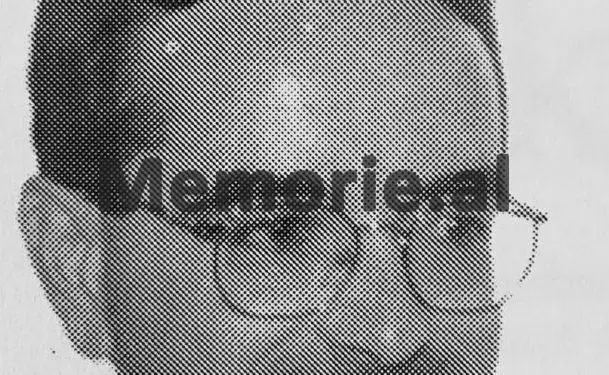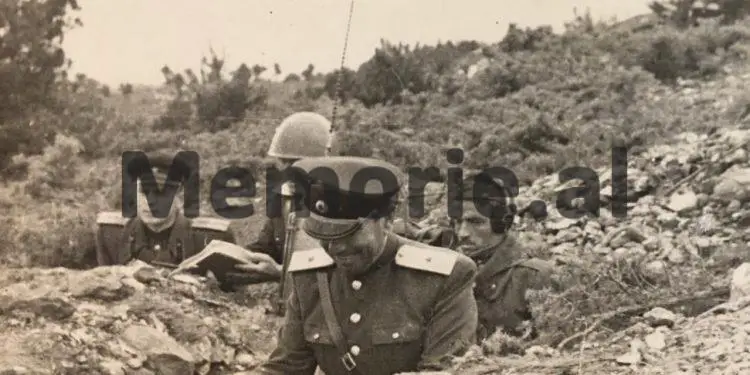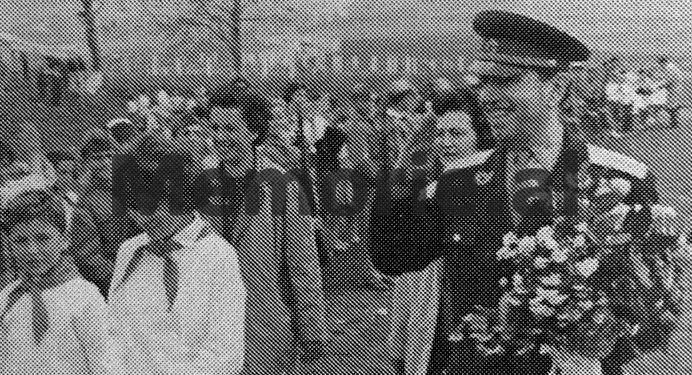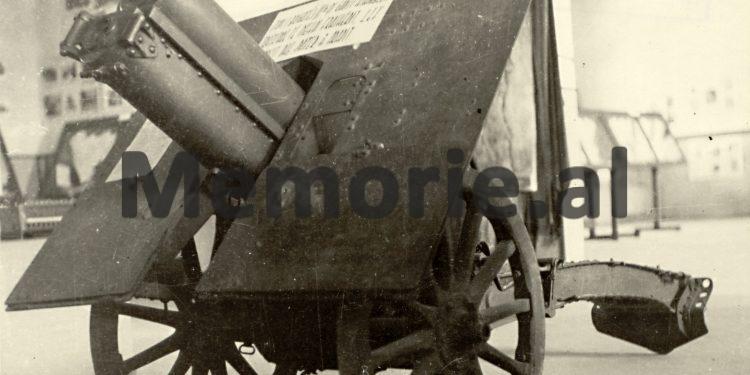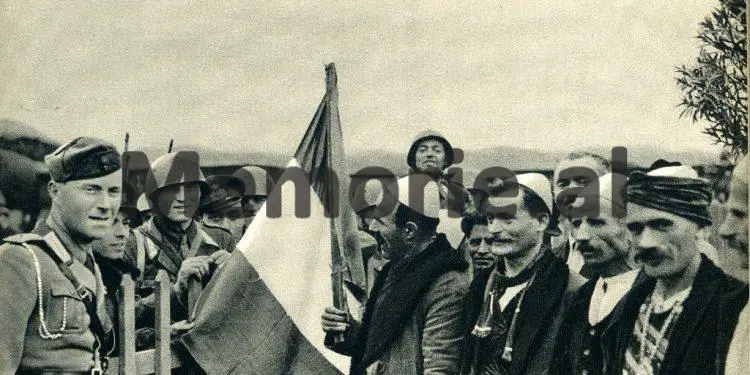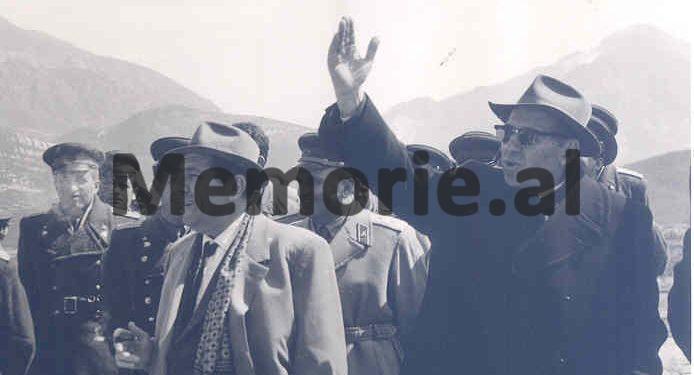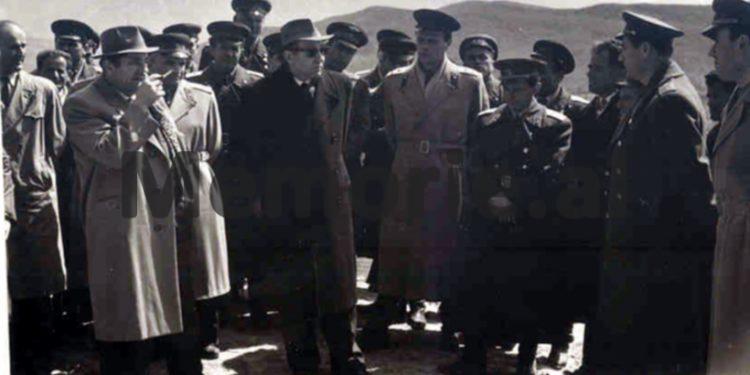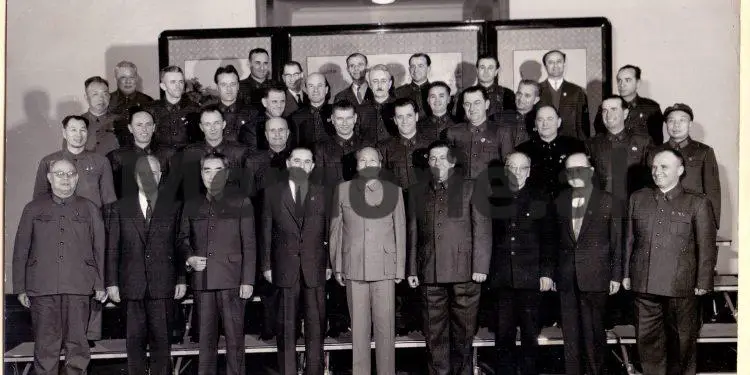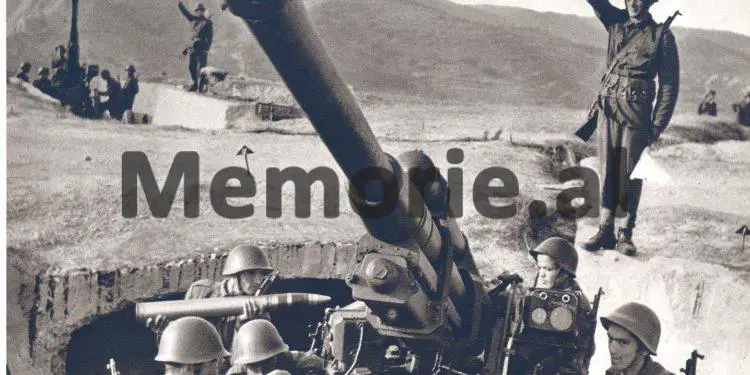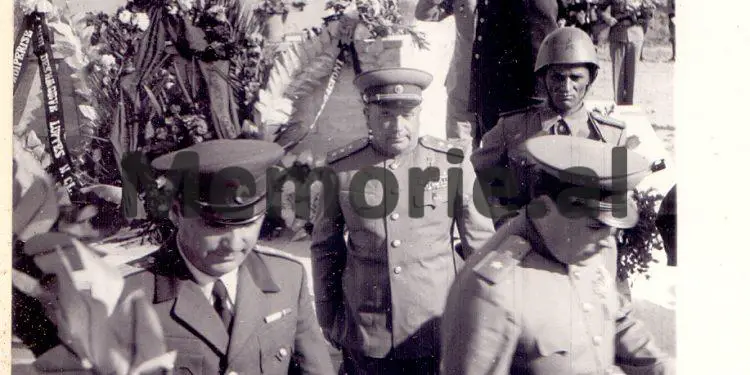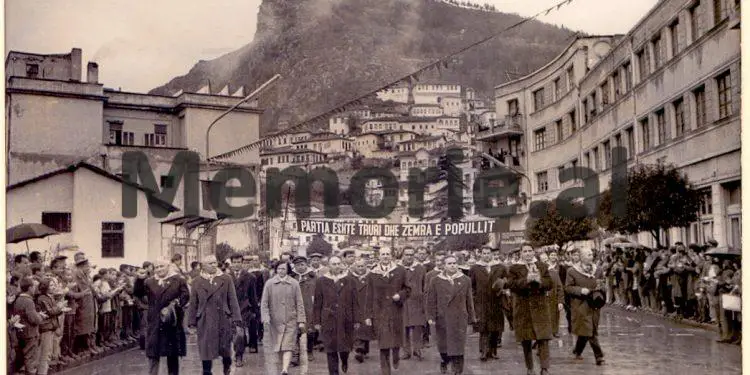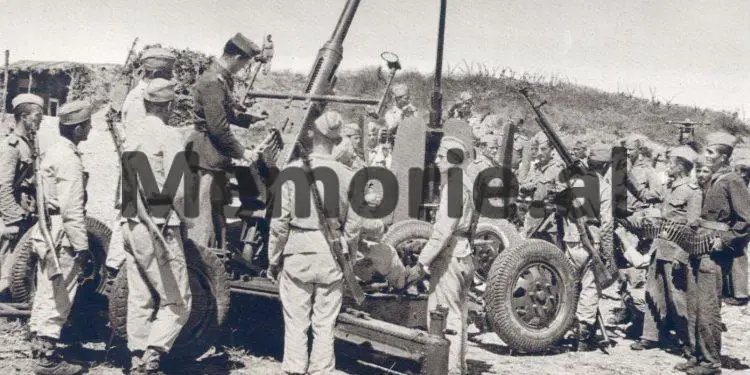Dashnor Kaloçi
Memorie.al publishes the unknown story of Todi Naço, originally from Pogradec, whose father, Spiro, a close friend of Fan Noli, after financing the construction of the Church of St. Kolli in the USA, in 1924, with Noli’s coming to power was appointed by him to the post of Secretary of the Municipality of Pogradec, as he was in great economic difficulties because he had spent all his savings for the establishment of that church. Sending his son, Todd, to study at the Royal Officers Completion School in Tirana, from where he later received a state scholarship to pursue studies at the Torino Military Academy in Italy, where he graduated with a high school diploma. of Artillery, earning the rank of lieutenant.
His return to Albania and desertion from the Italian-Greek war front in 1940 where he was effective in the “Tomorri” Battalion and his engagement in the Anti-Fascist Movement with his close friend, Reshit Çollaku, in the Pogradec area, after was persecuted by the Italian authorities who went to arrest and burn his house in the town of Pogradec, where the Italian officer, when he saw his rich library, left a note saying: “Mr. Nacho, a pity that a man culture like you, turn into a bandit. “
The emergence of the partisan Todi in Mehmet Shehu’s First Offensive Brigade, where he participated in all the battles that partisan formation fought until the end of the War, being as commander of Artillery and one of Mehmet Shehu’s close friends. Todd’s conflict with Enver Hoxha since the First Communist Party Congress in 1948, after Enver suspected that Naco and his other general, Tahir Kadare, had urged General Gjin Marku to ask Koci Xoxe in Congress that he to deepen in his self-criticism of the Commander-in-Chief’s blame, in particular for linking and signing the Reciprocal Cooperation Treaty with Yugoslavia, which had subsequently brought about the collapse of the Albanian economy.
The testimonies of his son, Fatos Naco, about the shift to Todi being sent to studies at the Soviet Voroshilov General Staff Academy where he graduated with high scores and his return to Albania, where he was appointed to several senior positions with the rank of Major-General, and as Commander of the Albanian Army Anti-Artillery Artillery, where he served with rare will and passion until 1975 when he was accused of being “a close associate of Beqir Balluku. ”And was interned in the district of Berat, where he worked as a mortar worker until 1985 when he died in the village of Lapardha due to a lack of a doctor and burying carts with only three family members.
follows from the previous number
Internment in Berat
But how were former General Todi Naço and his family treated after leaving Tirana and being interned in the villages of Berat? For this, his son, Fatosi remembers: “In the city of Berat we were placed in an apartment in the suburbs and from the beginning we felt very bad there because everyone was looking at us and pointing fingers at us, saying: ‘Here are the enemies of the people’, which made it even more difficult for us to find our spiritual state in which we became family after leaving Tirana. The most unbearable thing for us was when we left the house to buy something in the shops, where all the people stopped and looked at us, pointing at us, saying the permanent refrain; ‘O son of the enemy, O son of the ballist’. Then I was young and I didn’t understand some things very well, and as soon as I got home I was very upset and I said to my father: Why do you call me the ballist’s son, were you a partisan? In Berat, his father was employed as a shovel worker on a construction site that produced mortar, which was located outside the city, somewhere in the village of Velabisht, where his father rode his bicycle every day. While her mother, who had worked as a teacher in Tirana, was employed there as a worker in a tobacco workshop. The work his father did there on the lawn was so heavy and captivating that he weighed 90 pounds. that was, fell to 60 kg. After several months of our visit to Berat, the father was called by the secretary of the enterprise party where he worked and said: ‘Todi, you will not work anymore and we will pay the full salary, but we ask you to write to us. what do you know about your comrades, former generals’. The father refused to do that job, although he was asked to do so several times, and after that refusal, he told us that we had to prepare for another blow that he did not know how it would come to us “, Fatosi recalls the situation in which The family and his father became famous Artillery General, who, although he had graduated from schools and military academies in Tirana, Turin and Moscow, ended up working as a laborer in a mortar yard in the village of Velabisht in Berat, considered an enemy. of the people.
Unmasking in front of the people in Berat
But what happened to Todd Nacho after he refused to testify about his former generals? Regarding this, Fatosi testifies: “In the city of Berat we were left for a year and three months. After that, on April 1, 1976, we were informed that we had to show up at the meeting of the Democratic Front of the neighborhood where we lived. At that meeting where all the residents of the neighborhood had gathered, the Presidency of the Front, according to the order form above, had organized it especially to make a public unmasking of our family. At the beginning of that meeting, the leadership of the Front analyzed and made public the unmasking of two other people, where one was accused of theft, and the other because he was of Yugoslav descent. After that, the chairman of the Front stood up and said: ‘Today we have gathered to analyze the activity of Todi Naço, who is one of the collaborators of the coup d’etat group of Beqir Balluku’, and then he listed a series of accusations, such as schooling of his father in Italy and the Soviet Union, which he called hostile countries, as well as his participation in the Italo-Greek war with the rank of captain. After all the accusations that the crowd was waiting for with irritation, the chairman of the Front continued, saying: ‘We as the perpetrator have made the decision to internally deport the enemy of the people, Todi Naço, but we also wanted to know your opinion. After that, the whole crowd stood up shouting hysterically: ‘Shoot, shoot. On the rope, on the rope, the enemy of the people. ‘ In those moments as the crowd continued to shout, my mother fainted and my father told me to keep him from falling to the ground. After the meeting was over and the calls of the people, who had been well instructed by the Front Presidency, had not yet been completed, we were taken to the neighborhood offices and ordered to prepare because they would be deported the next day. When we got out of there to go home, all along the way we were under the gaze of people standing on the sidewalks and looking at us as enemies. Throughout that night, we remained anxious, not knowing where they would take us, and only the next day, when the car arrived with the police officers who would accompany us, we learned that we would be interned in the village of Lapardha, ”recalls Fatos Naço. who made it to his family in front of the residents of the neighborhood in the city of Berat, after his father, Todi, refused to testify about his comrades, former generals, and other soldiers that Enver Hoxha had declared enemies of the people and collaborators of Beqir Balluku.
Internment in Lapardha
But how did the life of the family of former General Todi Naço flow than in Lapardha of Berat, where they were sent as internees and how were they treated by the inhabitants of that village? In this regard, Fatosi recalls: “In the village of Lapardha in Berat we were placed in an old apartment and the mother was assigned to work in agriculture, while the father, who retired, went out himself to help the mother in order for her to make the norm. and earn that little money to earn a living. After that, our brother, Gavroshi, was interned in Plug, Lushnja, and after graduating as an engineer, he worked for some time in Lushnja. For some time he was deprived of the right to practice the profession for which he had graduated. There in the village of Lapardha, although we showed up two or three times a day at the People’s Council offices, and to move on to any problems we had for the city, we had to get permission from the Council and wait for it to be given to us. that when we were in Berat, This came from the treatment of the villagers there, although we had the seal of the enemy, and the people, before giving us any salutation, turned their heads to see if anyone was looking at them. In the village of Lapardha we were constantly under strict surveillance and from time to time there were provocations from people assigned by the State Security to check us at every step, who were constantly instructed: Be careful Fatos, not to sabotage us. ‘. I listened to this refrain almost every day, although I worked with a shovel, opening canals and cfurk on grass mills. When we thought that our internment was over, (a few days before we filled the first five years) a person from Tirana came to us and informed us that: five more years of internment had been added to us, which we had to do right there… The father objected to that decision, but he told us that was the order. In 1984, when our second five-year internment ended, another man from Tirana came and informed us that another five years of internment had been added. Then my father was very upset and told us: Here they brought us to die because Enver Hoxha does not want evidence. We will all die here. ‘ During those years, my father kept a diary, secretly writing during the day when my mother and I were at work. Although he kept that diary hidden, my mother and I often found a way to read it. What stood out in his notes was the evolution of his thoughts on Enver, where Todi, from a convinced communist, turned into a staunch opponent of the political line he had followed and was pursuing Enver Hoxha “, Fatosi recalls. regarding the treatment of their family in exile and his father, Todin, who began secretly writing in his diary about Enver Hoxha.
Todi in his diary: Bloody Enver
What did Todi Naço write in his diary about Enver Hoxha and what did he say about his and his family’s future? In this regard, Fatos testifies: “At the beginning of that diary, my father wrote: I am a convinced soldier and wherever I am sent, I will work to make up for the mistakes I have made.” And after a few years, he started writing openly against Enver Hoxha and from time to time used the expression: ‘No matter how much Nasi is in the Castles, his mother does not enjoy evlatë’. Nasi was a fool who lived in the Kala neighborhood of Berat, who had become the terror of the mothers of that neighborhood, after beating the children where he found them. With Nasin, his father meant Enver Hoxha, and without fear of being eavesdropped on, he openly told us: ‘One day Enver Hoxha will come and drown in the blood of his comrades.’ Although my father told us that our destiny was premature and we would die in exile there, he cared for me and in the evening when I returned from a tiring job, he taught me foreign languages, as he was fluent in French, Italian, and Russian. and in those conditions, he tried to learn English as well. Since I was tired of the hard work with the pickaxe, I used to say to him: ‘What do I need foreign languages for when I work all day on the channel’?!. Then he said to me, ‘I will not please you, but you will one day be saved, and it will take a long time.’ Although his father had lived in the Soviet Union for more years than in Italy, he always remembered with nostalgia only the time he had studied in Italy. After December 1981, when the incident with Mehmet Shehu and many of his father’s friends who had been interned, were arrested and ended up in prison, my mother and I took his diary and burned it for fear of what he had written there. My father was very upset about this and he spoke harshly to his mother, and he wanted to shoot me “, Fatosi recalls the great vicissitudes and sufferings of the family during the internment period and the change of his father’s beliefs regarding the figure of Enver Hoxha.
Todi’s death, the doctor does not come, is buried with carts
But how did the life of the family of the famous general Todi Naço flow after the completion of the second five years of exile there in the village of Lapardha? In this regard, Fatos recalls: “In 1984, due to the work that my father had done during the period of internment, he became seriously ill and we were faced with great difficulties, as the doctors did not come home to visit him because we called enemies of the people. We also did not have the opportunity to send him to the hospital because we were interned and needed some permission from the People’s Council of the village, the People’s Council of the city, and the police. It took days for his father to get permission to visit or hospitalize his father, which led to further deterioration of his health. So on the morning of March 7, ’85, the father was in a very serious condition and my mother and I left him alone at home because we went to make the usual appearance in the council offices. After we showed up there, we went and met the doctor who, after we told him about the situation his father was in, he replied: I see that I can’t come, but if you have the opportunity, get a permit and bring your father hereby cart. When we got home my father was dead. The chairman of the Cooperative, who was also a candidate for the Central Committee, ordered that his father be buried outside the village cemetery. This order was returned after Tirana announced that there was no problem for him to be buried in the village cemetery “, Fatosi recalls the tragic death of his father there in exile because the doctor refused to visit him as he asked permission to go to the home of the “enemy of the people.” So that afternoon in March 1985, while the two brothers Fatosi and Gavroshi, together with their mother were escorted to the last apartment their father, the former famous lieutenant general Todi Naço, the village carpenter, the only man “who he was close to them ”he said: Quickly, quickly, because they are looking for my cart…”?!. Memorie.al




